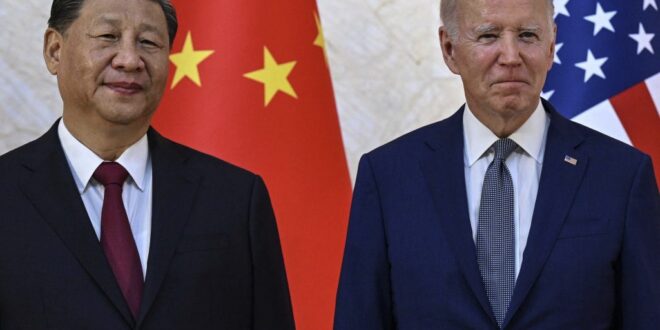U.S. policy toward China appears to be suffering from a belief in magic – that, for instance, withdrawing from Afghanistan would be a great idea; that Putin would be happy with a “minor incursion” into Ukraine; that the Chinese spy balloon was “silly;” that the mission of education and the military should be to ensure “equity,” leading one veteran to say that the US is “trying to out-pronoun our enemies;” and that America’s southern border, with agents trying to process reportedly 8,000 illegal migrants each day, thereby leaving vast swaths of land open to traffickers, smugglers and terrorists, is “secure.”
Regrettably, the Biden Administration seems to be letting itself be outmaneuvered in countering the imminent threat of war posed by China’s leader Xi Jinping and his ruling Communist Party.
Blinken swallowed the airport insult and met anyway with, among others, his Chinese counterpart and Xi himself. They held what the State Department called “a productive conversation, a real exchange.” Chinese officials likewise said the talks were “candid, in-depth and constructive.” Oh good! Then we have nothing to worry about!
At home, Xi has continued to tighten party control over the economy even as economic growth has faltered and unemployment climbed. Why pursue antagonistic policies abroad and counter-productive ones at home?
Xi’s objectives are not economic growth or good relations but rather to insulate China from outside sanctions and other pressure like that, orchestrated by the United States and NATO against Russia for its invasion of Ukraine. — J. Kyle Bass, founder of Texas-based Hayman Capital Management, July 12, 2023.
“The day Yellen landed in China, Xi told the Eastern Military Command to prepare for war. I think it’s highly likely he invades Taiwan.” Not by 2027, as estimated by U.S. intelligence, but “in 12 to 18 months.” — J. Kyle Bass, July 12, 2023.
U.S. policy toward China appears to be suffering from a belief in magic – that, for instance, withdrawing from Afghanistan would be a great idea; that Putin would be happy with a “minor incursion” into Ukraine; that the Chinese spy balloon was “silly;” that the mission of education and the military should be to ensure “equity,” leading one veteran to say that the US is “trying to out-pronoun our enemies;” and that America’s southern border, with agents trying to process reportedly 8,000 illegal migrants each day, thereby leaving vast swaths of land open to traffickers, smugglers and terrorists, is “secure.”
Regrettably, the Biden Administration seems to be letting itself be outmaneuvered in countering the imminent threat of war posed by China’s leader Xi Jinping and his ruling Communist Party.
Three cases in point:
John Kerry, Biden’s climate envoy, landing in China in mid-July, declared that the country was doing an “incredible job” developing renewable energy sources. He also asked it to reduce its world-leading coal-fired electricity production.
Not exactly likely. On January 24 2022, the Chinese ruler told party leaders that carbon goals should not undermine energy or food supplies. China opens two new coal-fired generating plants a week, according to multiple reports.
Then there was Secretary of State Antony Blinken’s visit to China in June. Even before Blinken could deplane, Xi let Washington know who he thought was boss. When the secretary of state arrived — for the first trip to China by a top U.S. diplomat since 2018 — no senior Chinese official went to the airport to greet him: no red carpet, no ceremony. This non-encounter took place after Blinken’s journey had been postponed following the February shoot-down of a Chinese spy balloon that had snooped its way over many of the most sensitive military installations across the United States. Blinken swallowed the airport insult and met anyway with, among others, his Chinese counterpart and Xi himself. They held what the State Department called “a productive conversation, a real exchange.” Chinese officials likewise said the talks were “candid, in-depth and constructive.” Good, so we have nothing to worry about!
Secretary of the Treasury Janet Yellen apparently thought so too. When she arrived on her pilgrimage ahead of Kerry in July, she actually bowed repeatedly, as Fox News showed—in the Chinese fashion of an inferior kowtowing to a superior—three times, “optics the Chinese love,” before Chinese Vice Premier He Lifeng.
Doing business
“Criticism of Yellen’s apparent obsequiousness, was ‘just noise'”, Mary Lovely of the Washington, D.C.-based Petersen Institute for International Economics told Bloomberg News. The treasury secretary went to Beijing “to do business” and put guardrails up to decrease tensions and “manage” U.S.-China relations.
What have Xi and his hand-picked team atop the party-government pyramid been doing to install guardrails and manage the critical relationship? Here are a few recent illustrations:
The Wall Street Journal revealed that China uses Cuba for extensive surveillance of the United States and military training. Miles Yu, who was China policy advisor to then Secretary of State Mike Pompeo, wrote in a June 29 Wall Street Journal op-ed that "China's spying installations and military training in Cuba reflect the Communist Party's plans for global dominance";
China maintains "police stations" in at least 53 countries around the world — as well as in Manhattan — from which, according to reports, to intimidate expatriate dissidents and others, and threatening them with "arrest" -- meaning kidnapping and imprisonment in a Chinese gulag;
Former Canadian Conservative Party leader Erin O'Toole, in a speech to Parliament, said he had been told that Beijing used proxy agents to spread disinformation about his party via the Chinese-operated WeChat instant messaging service. This followed similar charges by parliamentarian Michael Chong;
The Chinese Communist Party hacked the e-mails of senior U.S. officials, including Commerce Secretary Gina Raimondo before her planned trip to China.
Beijing decided early in July to restrict exports of germanium and gallium, key elements in semi-conductors and missile systems. China retaliated against U.S. trade restrictions, citing "national security" .Xi’s real purpose
At home, Xi has continued to tighten party control over the economy even as economic growth has faltered and unemployment climbed. Why pursue antagonistic policies abroad and counter-productive ones at home?
J. Kyle Bass, founder of the Texas-based hedge fund Hayman Capital Management, thinks it is due to China’s vulnerability to petroleum and liquid national gas sanctions. Bass said on July 12 that Xi’s objectives are not economic growth or good relations but rather to insulate China from outside sanctions and other pressure like that, orchestrated by the United States and NATO against Russia for its invasion of Ukraine.
According to Bass, in 2020, China possessed 100 intercontinental ballistic missile launchers, and last year, the tally reached 450. This year, he said, Fujian province, opposite Taiwan, opened 18 new air raid shelters, a major military hospital and conducted a large-scale blood drive.
Holding U.S. dollars, China “should be buying short-term Treasury notes,” Bass stressed. Instead, “the curve is going in the opposite direction.” Beijing is building its gold reserves.
“The day Yellen landed in China, Xi told the Eastern Military Command to prepare for war. I think it is highly likely he invades Taiwan,” Bass said. Not by 2027, as estimated by U.S. intelligence, but “in 12 to 18 months.”
Bass said he believes the United States and its allies can prevail against China in a conflict over Taiwan and its democratically-governed 24 million people, but only if everything needed for defense “is on the island on day one.”
Also, it must be added, only after American leaders drop their belief in magic and speak realistically to the public.
 Eurasia Press & News
Eurasia Press & News



